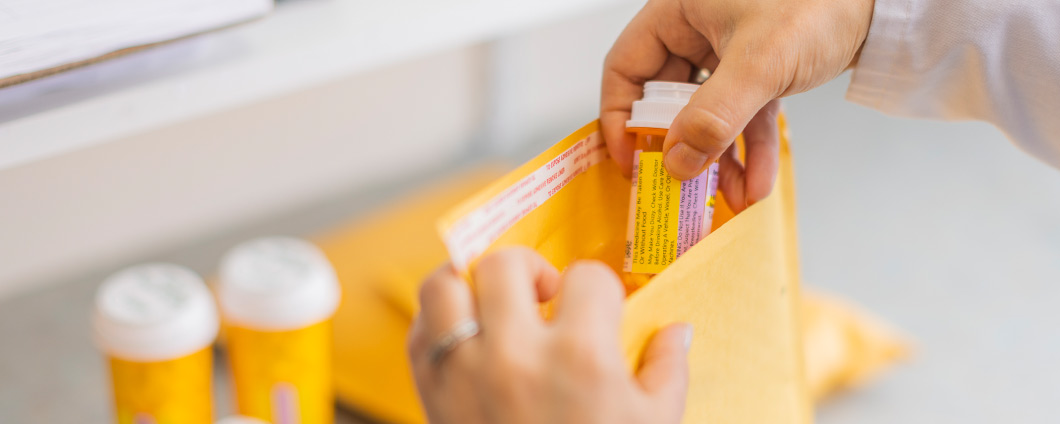Search
-
Name-Brand Medication vs. Generic: What's the Difference?
Most prescriptions meds are available in generic form. Find out the similarities and differences between the two and how to determine whether a generic is right for you. Approximately 80 percent of prescriptions sold today are generics. If you’re taking a prescription medication, chances are it’s a generic form of the brand-name drug. But are you getting the same quality in a generic medication? Do generics measure up? The answer in most cases is yes — generics, just like branded products, are regulated by the Food and Drug Administration. “To have a generic product approved by the FDA, the generic manufacturer must prove that its product is bioequivalent to the branded product,” explains Adam Porath, PharmD, BCPS AQ-Cardiology, BCACP and Vice President of Pharmacy Services. Basically, it has to function the same. “Generic products are extremely well tolerated and will provide the same results as using a branded product,” Porath says. Here’s how generics are the same as name-brand prescriptions: Generic products contain the same active ingredients. They produce the same desired clinical effect and accompanying side effects. Generics come in the same form as their branded counterparts: pill, liquid or inhaler, for example. Release into the bloodstream matches the name brand in timing and strength. Here’s how they differ: Generics generally cost less. Federal law requires generics have different names and look different: shape, size, markings and color. Generics contain different inactive ingredients, like binders, fillers and artificial colors. Different side effects with generics can usually be attributed to these additions. Why do generics cost less? When pharmaceutical companies develop a new drug, they are paying for research, development, clinical studies, marketing — in some cases it can cost more than $800 million and take 10 to 15 years to develop a new drug. “The manufacturers of branded medication products have to recoup their research and development costs,” Porath says. So companies are granted a limited patent to sell their drug without the competition of generic counterparts. “When patent exclusivity ends, the market is open for any generic manufacturer to make a competing product with FDA approval.” Without the same startup costs, companies can sell generics at 80 to 85 percent less. And because more than one company can produce the same generics, competition drives prices even lower.
Read More About Name-Brand Medication vs. Generic: What's the Difference?
-
Low Back Pain – How to Stop the Ache
Low back pain is not only a problem most people have at some point in life, but also the leading cause of disability in the U.S. Whether it is a sharp spasm from lifting something heavy or a daily constant ache, there are various treatments available to relieve your pain. Jessica Ryder PT, DPT, cert VRS, with Renown Health Outpatient Therapy, explains some common causes of this pain, how to treat it and ways to prevent pain flare-ups. It’s important to realize most cases of low back pain are short term. Frequently lasting only a few days or weeks. In general these cases leave no long-term damage to the spine, muscles, discs or nerves. “However, it can become episodic or chronic (lasting longer than 12 weeks) if it is not properly understood or managed by the individual, ” cautions Ryder. Causes of Pain Specifically back discomfort can be related to: Wear and tear on the spine due to age or poor movement patterns Injury to spinal discs Sprains (overstretching or tearing of ligaments) and strains (tears in tendons or muscles) Trauma Irregularities of the spine present at birth (example: scoliosis)Notably the above issues may result in a “pinched nerve” or sciatica, causing pain to extend down the leg. Risk Factors for Pain In particular, your chance of developing low back pain increases with the risk factors below: Age Being overweight Low fitness level or occasional physical activity (“weekend warrior”) Family history Pregnancy Poor posture Jobs requiring heavy physical work (landscaping, plumbers, construction, etc.)
-
Family-Friendly Bike Trails in Our Region
Bicycling is a great way to get the whole family moving. We’ve reviewed some family-friendly bike trails that’ll get everyone outdoors for some good, old-fashioned fun on two wheels. During the ongoing COVID-19 (coronavirus) pandemic, it is important to practice physical distancing and wear a mask when it’s impossible to stay six feet away from others. 1. Damonte Ranch Wetland Loop in Reno Duration: 3.1 mile loop. Skill Level: Easy. This paved loop trail is easy to access and has ample wildlife viewing opportunities with plenty of birds and wildflowers in the wetland. Parking and Trail Access: Start at Damonte Ranch Park and follow the paved trail around the wetland loop. 2. Tahoe East Shore Trail Duration: 5.2 miles out and back. Skill Level: Easy. The Tahoe East Shore Trail closely hugs the shore of Lake Tahoe. The paved trail has mild inclines that make it the perfect adventure for all ages and skill levels. Parking and Trail Access: Park along State Route 28 in Incline Village near Ponderosa Ranch Road for direct access to the trail. 3. Caughlin Ranch Trails in Reno Duration: 3.5 miles out and back Skill Level: Easy. This paved trail wanders through the Caughlin Ranch neighborhood and features creeks, wildlife and shade. Parking and Trail Access: Park along Caughlin Ranch Parkway for easy trail access. 4. Sagehen Creek Trail in Truckee Duration: 6 miles out and back. Skill Level: Intermediate. This dirt loop trail is a short drive from Reno and ends at Stampede Reservoir. Parking and Trail Access: Park at the marked trailhead off of North Highway 89. 5. Truckee River Trail in West Tahoe Duration: 7.5 miles one way. Skill Level: Intermediate. Looking for a longer trail? This point-to-point trail meanders along the Truckee River through the scenic Olympic Valley. Parking and Trail Access: Park at the Squaw Valley Village or in Tahoe City. Coordinate with two cars to make the trip one way. What family-friendly bike routes does your family enjoy? We’d love to know!
-
Generic Drugs – What You Need to Know About Them
Without a doubt, taking medications can not only be expensive, but also confusing. In the United States, generic prescriptions are widely used, with 9 out of 10 people choosing them over a name brand. Pharmacists are a great resource to help us understand the benefits and side effects of any medication. We asked Adam Porath, PharmD, Vice President of Pharmacy at Renown Health, to answer some common questions about generic drugs. What is a generic drug? A generic drug has the same active ingredients of brand-name drugs. Brand-name drugs have a patent (special license) protecting them from competition to help the drug company recover research and development costs. When the patent expires other manufacturers are able to seek approval for a generic drug. However, the color, shape and inactive elements may be different. Per the U.S. Food & Drug Administration (FDA), a generic medicine works in the same way and provides the same clinical benefit as its brand-name version. Why do they cost less? Generic drug makers do not have the expense of costly development, research, animal and human clinical trials, marketing and advertising. This savings is passed on to the public. Also after a patent expires, several companies will compete on a generic version of a drug, further driving down prices.
Read More About Generic Drugs – What You Need to Know About Them
-
Pharmacists Answer Questions about the COVID-19 Vaccines
Vaccines that provide protection against the COVID-19 virus are bringing us closer to the end of this deadly pandemic. Two different COVID-19 vaccines are currently available in the U.S. today: one from Pfizer and the other from Moderna. Kate Ward, PharmD, BCPS, Director of Clinical Pharmacy at Renown Health and Adam Porath, PharmD, Vice President of Pharmacy at Renown, share what you need to know about these vaccines. When two COVID-19 vaccines were approved by the U.S. Food & Drug Administration (FDA) in December 2020, it was cause for celebration. Why? Because according to the CDC, the vaccines are 94 percent or more effective in providing protection against the COVID-19 virus! Many people are seeking information about the new Moderna and Pfizer vaccines. Below, our pharmacy leaders provide answers to some commonly asked questions. How do the COVID-19 Vaccines Work? The Pfizer and Moderna vaccines are both mRNA vaccines that help your immune system develop antibodies against the COVID-19 virus. The vaccines use messenger RNA, or mRNA, to show our bodies’ protein-making cells how to make the spike proteins of the COVID-19 virus. Our immune system reacts to these spike proteins by creating antibodies that can recognize and destroy them. So when a person is exposed to the virus in the future, they will be less likely to get sick. What are the Differences between the Pfizer and Moderna Vaccines? The Pfizer and Moderna COVID-19 vaccines are very similar, with just a few small differences worth noting. The main difference between the two vaccines is when you should receive your follow-up dose. Patients who receive a first dose of Pfizer should receive their second dose about three weeks later. Those who receive a first dose of Moderna should receive their follow-up vaccination roughly four weeks after their first dose. People 18 years and older can receive the Moderna vaccine while people 16 years and older can receive the Pfizer vaccine. Dosage for the Moderna vaccine is 0.5 ml (100 mcg). Dosage for the Pfizer vaccine is 0.3 ml (30 mcg).
Read More About Pharmacists Answer Questions about the COVID-19 Vaccines
-
Five Reasons to Switch to Renown’s Modern-Day Pharmacy
Renown Health has two retail pharmacy locations – one at Renown Regional on Pringle Way and another on Locust Street. And while many people think of a pharmacy as where we get prescriptions and pick up refills, it’s so much more. Adam Porath, vice president of pharmacy services at Renown, discusses five benefits of switching to a Renown Pharmacy. 1. Hospital Integration With the Meds-to-Beds Program, the Renown Health Pharmacy delivers prescriptions to patients on the floor when they leave the hospital. Another thing that is interesting about the pharmacy is its integration with providers. So, if there is a problem with your prescription, the Renown Pharmacy can get hold of your provider right away. We also can see your lab results and make sure that the dose you are prescribed is the right one. 2. On-Site Vaccinations The Renown Health Pharmacy has a private consultation area to administer vaccines on-site. Their team routinely stocks more than a dozen vaccines, and you can call either location (Regional: 775-982-7737 and Locust Street: 775-982-5280) to see if what you're looking for is in stock. Appointments are available in MyChart. 3. Compounding Services Only a fraction of pharmacies in the United States provides compounding services. In the Reno/Sparks area, there are just a few and Renown Pharmacy is one of them. Traditional retail pharmacies take drugs received from a drug manufacturer and put them into a smaller container in the individual amount that the doctor prescribed for a patient. A compounding pharmacy provides medications that are not available commercially. For example, a doctor has prescribed a dose that is smaller than what is commercially available. Compounding the medication will provide the dosage as prescribed. Another example could be a child who can’t take a tablet. The pharmacy may be able to use compounding to convert medications into something that is the child can take.
Read More About Five Reasons to Switch to Renown’s Modern-Day Pharmacy
-
Dorm Safety and Bacterial Meningitis
Bacterial meningitis is probably the last thing on your mind as you help your child prepare for college. Buying books and stocking up on necessities may top your list, but it’s a good idea to ensure your student is up-to-date on their meningitis vaccine. How Bacterial Meningitis Spreads According to the Centers for Disease Control and Prevention, people living in close quarters are more likely to spread this illness to one another. For example, you may have heard about the higher risk of meningococcal (or bacterial) meningitis for new college students. The risk is so serious that many colleges and universities require proof of a vaccine for new students moving into campus housing. This includes the University of Nevada, Reno. To clarify, all incoming freshmen under 23 years of age must show proof of their up-to-date meningitis shot. “Bacterial meningitis is considered a medical emergency, and anyone with the signs and symptoms should be evaluated in the emergency room immediately,” says Vanessa Slots, MD, Renown pediatrician. Symptoms of Bacterial Meningitis Fever Nausea Vomiting Irritability Headache Confusion Back pain Stiff or painful neck Leg pain Light sensitivity Rash on the torso or lower extremities It’s important to know many of these symptoms for both bacterial and viral meningitis are the same. However, the viral type is more common, often clearing up in seven to 10 days without complications. Nonetheless, you should go to the emergency room to be looked at, as the signs are similar for both illnesses. Why is Bacterial Meningitis Dangerous? This illness moves quickly, and in some cases, it can seem like the flu or severe strep throat and take a few days to develop. Or, it can hit in just hours. “Bacterial meningitis has an overall death rate of 10 to 15 percent despite treatment with antibiotics,” Dr. Slots warns. Another critical point is problems after recovery can also be severe. Frequently these include brain damage, amputations, infections around the heart, seizures and shock.
-
Pharmacy Mail Order Thank You
Your Request is On The Way Thank you for completing the secure online Pharmacy Rx Mail Order form. Our pharmacy staff will start working on your request immediately. We'll contact you to set up your first shipment in the next seven days.
-
Renown Pharmacy Vaccinations
Pharmacy Vaccinations by Appointment The Renown Pharmacy team can order additional vaccines with advanced notice. Please call 775-982-7737 before scheduling to check on availability. Renown Pharmacy provides vaccinations by appointment for the following: Bivalent Vaccine (Updated COVID-19 vaccine booster) COVID-19 (Pfizer-BioNTech for 12+ and Moderna) Tetanus, provided though the tetanus, diphtheria and pertussis (Tdap) booster (Adacel) Measles, Mumps, Rubella (MMR) Shingles vaccine (Shingrix) Pneumonia vaccine (Pneumovax23 and Prevnar 20) Influenza/Flu vaccine (High dose for 65+ and standard dose for those six months to 64 years) Meningococcal (meningitis) vaccine (Menactra) Meningococcal B vaccine (Trumenba) Hepatitis B vaccine (HEPLISAV-B) Human Papillomavirus (HPV) vaccine (Gardasil 9) Monkeypox vaccine (JYNNEOS) You may request appointments for any of these vaccines within MyChart
-
Renown Children's Hospital Announces 2021 Children's Miracle Network Champion Child Ambassador
Despite numerous medical challenges, Emmalee Sutton is a determined, bright and outgoing 14-year-old with a joy for life and passion for helping others. Renown Children’s Hospital and Children’s Miracle Network Hospitals (CMNH) are excited to announce Emmalee Sutton as the 2021 Champion Child Ambassador. A fighter from a very young age, 14-year-old Emmalee has been a source of hope and inspiration to everyone she meets, never letting her medical challenges slow her down. A video introducing Emmalee and her journey can be found here. Emmalee was diagnosed with autoimmune hepatitis at age 2, and she has endured a long road of illnesses and hospitalizations since. She also has Addison’s disease, which means her body under-produces critical hormones. She had her gallbladder removed at age 8, port surgery at 13, and has received several liver biopsies over the years. Over time, heavy steroid use has stunted her growth — at 14 years old, she is 49 inches tall. It has also caused extreme weight gains and losses. She also faces daily issues with her calcium, potassium and sodium levels. Due to her lack of immunities, she is unable to attend school in-person but is on the home/hospital program through the Washoe County School District. Despite Emmalee’s medical challenges, her sheer joy and spark for life remains untouched. “I am so honored to be chosen as the 2021 Champion Child Ambassador and represent all the kids at Renown Children’s Hospital. I hope my story can inspire other young patients to believe in themselves,” said Emmalee. “It can be hard dealing with health challenges, but I always think about those who have it worse than me. Instead of complaining about the things I can’t do, I celebrate all the things I can do.” “We can all learn from Emmalee’s enthusiasm, determination and positive outlook,” said Tony Slonim, MD, DrPH, President & CEO of Renown. “She has never met an obstacle too great or faced a challenge too difficult, and she effortlessly inspires others to view life through that same lens. Emmalee has already touched so many hearts here at Renown, and as our 2021 Champion Child Ambassador, her impact is sure to be incredible.” Emmalee loves to talk to and help other children, especially when she visits Renown Children’s Hospital for treatments. One of her favorite things to do in the hospital is visit with other patients and try to make them feel better. “Emmalee is very patient with all the doctors she sees, the medications she takes and the frequent lab testing and blood draws she receives,” said her mom, Ann Sutton. “She always remains positive and comforts those who think they are hurting her. This makes her quite the beloved patient at Renown Children’s Hospital!” Emmalee enjoys spending time with her four dogs and rabbit, and she also has an affinity for frogs, lizards and fish. She loves to sew and crochet, and for the past six years, she has held the title of top cookie-seller in her Girl Scout troop. When Emmalee grows up, she wants to be a pediatric nurse so she can help other kids who are going through what she has experienced. Her ultimate goal in life is to make the world a better place in many ways. “From the moment I met Emmalee, I knew she was a champion,” said Kiemmy Thai, MBA, Foundation Manager of Children's Hospital at Renown. “Her courage and perseverance inspire so many pediatric patients with hope when they need it most. Her smile is contagious, and her words of wisdom at such a young age will have a great impact on our community. We are excited to work with Emmalee and help bring out the champion in others.” Emmalee will serve as Renown Children’s Hospital’s CMNH Champion Child for the next two years, acting as the face of the hospital in the community and sharing her heartwarming and inspiring story. Supporting Champions Like Emmalee Funds from the Children's Miracle Network Hospitals’ have helped purchase equipment for several of the subspecialists Emmalee needs to see. Additionally, Emmalee has benefited from equipment that CMNH has funded during her in-patient stays, such as distraction machines, iPads and CinemaVision goggles. You can support local champion children like Emmalee by visiting renown.childrensmiraclenetworkhospitals.org. About Renown Children’s Hospital Renown Children’s Hospital is the only dedicated children’s hospital in northern Nevada, and offers a variety of programs and services designed specifically to care for the community's families. It has the region’s only Children’s ER and Pediatric ICU. Renown Children’s Hospital is the only hospital affiliated with Children’s Miracle Network Hospitals (CMNH) in the region and local CMN Hospitals' programs and events directly benefit children in the Truckee Meadows. It is also the only hospital in the region affiliated with CHA (Children’s Hospital Association). For more information, visit here. About Children’s Miracle Network Hospitals Children’s Miracle Network Hospitals® raises funds and awareness for 170 member hospitals that provide 32 million treatments each year to kids across the U.S. and Canada. Donations stay local to fund critical treatments and healthcare services, pediatric medical equipment and charitable care. Since 1983, Children’s Miracle Network Hospitals has raised more than $7 billion, most of it $1 at a time through the charity's Miracle Balloon icon. Its various fundraising partners and programs support the nonprofit's mission to save and improve the lives of as many children as possible. Find out why children's hospitals need community support, and learn about your member hospital, at CMNHospitals.org and facebook.com/CMNHospital.










